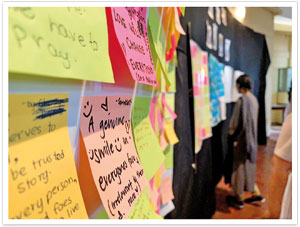‘Drop the Trigger’and end the cycle of hate
View(s):A bold and momentous project organised by the School Committee of Methodist College which address the issues of race, religion and social segregation-through a series of thought provoking, yet fun events.
 The 4/21 Easter Sunday attacks left us all devastated, regardless of race and ethnicity. Many hands of help were extended and gladly received.
The 4/21 Easter Sunday attacks left us all devastated, regardless of race and ethnicity. Many hands of help were extended and gladly received.
And yet, despite the positive response against terrorism that we demonstrated together as Sri Lankans, there were also several incidents of misplaced hatred igniting, turning into overt threats and even physical attacks.
Unresolved grievances, baseless assumptions, ignorance, the fear of the unknown and the blatant unwillingness to accept other opinions, make it possible for racism to spread easily and rapidly. We compound the problem when we fail to look each other in the eye and ask the questions that will create discourse; discourse that can pave the way to true reconciliation in Sri Lanka.
That being said, it is also very hard to initiate conversations on sensitive issues like race or religion, which are often veiled in numerous layers of socio-cultural stigma.
Nonetheless, the School Committee of Methodist College, in an attempt to create this much needed discourse, organized ‘Drop The Trigger’, a bold and momentous project which addressed the issues of race, religion and social segregation- through a series of thought provoking, yet fun events.
The name Drop The Trigger, (popularly referred to as DTT by the girls), alludes to the gun that everyone of us have within ourselves, that is capable of firing out hatred that can trigger catastrophic consequences, and the need to drop this cycle of hate.
The project began with a presentation at one of the regular morning assemblies, in which the members of the committee focussed onthe common misconceptions regarding the main religions/races in Sri Lanka. The presentation aimed at debunking these misconceptions (which included questions on the denominations of Christianity, Jihad in Islam, and the idea of meat consumption in Hinduism and Buddhism) using well-researched and meaningful arguments.
In addition to over 35 posters on unity and anti-racism, which were hung around the school premises, a Suggestions Box was also set up, where the girls could drop in questions, opinions or struggles they faced with regards to racism, to which the committee responded, either through the notice board or whenever they took assembly.
The highlights of the project were the after school sessions that took place on the 3rd and 5th of July. Each after-school session consisted of 4 main segments- A gallery walk, forum theatre, games and discussion. The participants were divided into age categories and went on to participate in the various games and Gallery walk segments under the supervision of a team leader, focusing on the common interests of the respective age group.The Gallery Walk was excellently and unbiasedly devised so as to give out a powerful message through the use of both visual and auditory elements.
The forum theatre, in which the cast acted out a scene depicting discrimination, and the students could later volunteer to replace a character and portray how the situation could be addressed differently by action and speech, was also a highlight of the programme. It brought out noteworthy performances from the young audience, emboldening them to stand up for one another if every faced with similar situations of discrimination.
The committee is currently working on the finishing touches to the final component of the project, a mural painting inside the school, involving the creativity the students themselves. The girls had fun hurling paint filled balloons at the wall, in order to create a colourful, abstract background for the mural. They will then fill in words and sayings that convey positivity and bring out the overall message of unity and togetherness that was the crux of the project.
The overwhelming amount of positive feedback from the participants and the other parties has proven the success of the project, ensuring that the students of Methodist College are well equipped to step into a society riddled with prejudices, and scatter the light of tolerance, unity and brotherhood.
The gun doesn’t run out of bullets, it only changes targets. Drop The Trigger and end the cycle of hate.
Amani Naeemullah -
In consultation with Ashvni Chandrakumar-Head Prefect


